

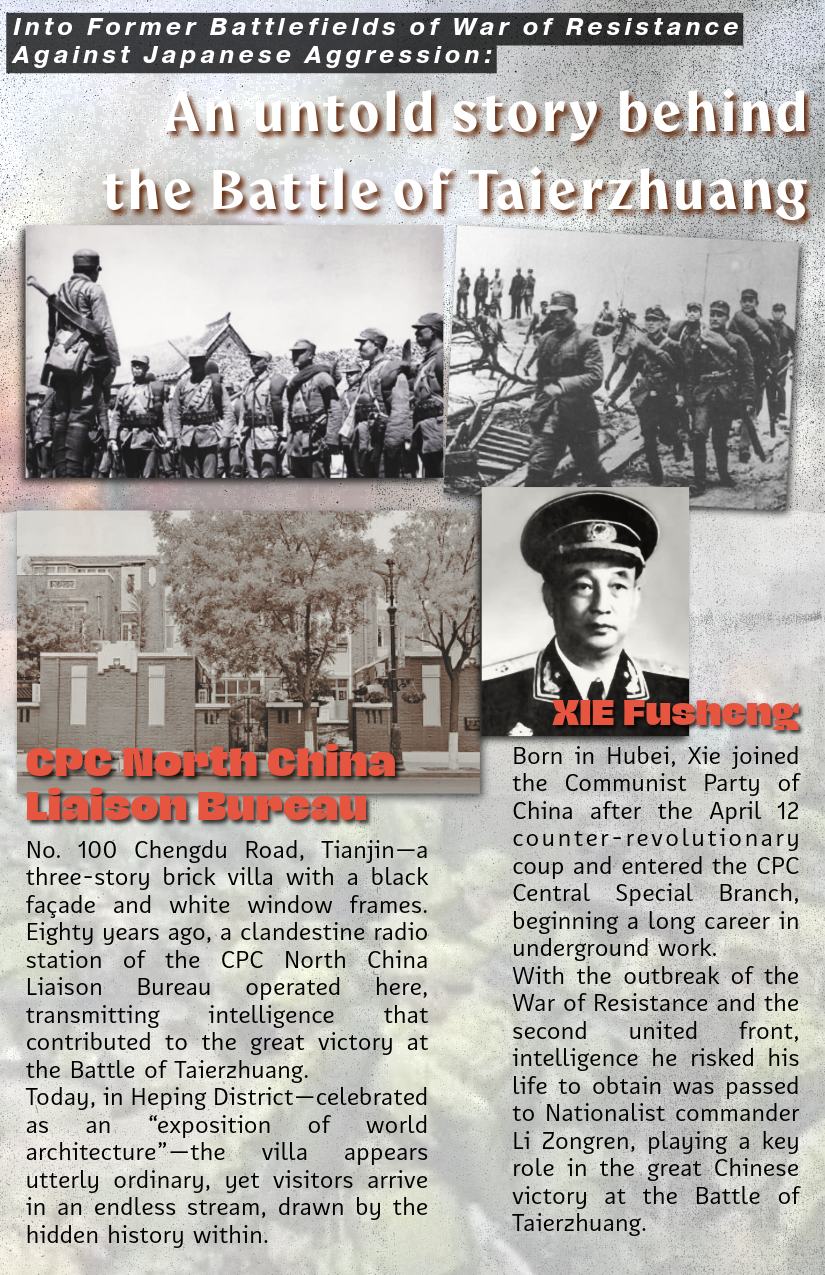
It was an evening in early 1938. A train slowly pulled into Peking, halting at Qianmen Railway Station.
Among the passengers disembarking was a well-dressed young man heading toward the exit.
“Where are you from?” A collaborationist police officer stopped him.
“Tianjin.”
“What’s your business?”
“Employee of a foreign firm.”
The young man calmly flashed his credentials. The officer’s expression immediately changed. Bowing respectfully, he said, “Ah, serving foreigners—please, go ahead!”
What the officer did not know was that this “foreign firm employee” was Xie Fusheng, a staff member of the Chinese Communist Party’s North China Liaison Bureau, an underground intelligence organ.
Xie Fusheng was born in Hubei and studied under communist pioneer Dong Biwu. He joined the revolution in his early 20s. After the April 12 counterrevolutionary coup of 1927, when the revolutionary movement entered a low ebb, he resolutely joined the Communist Party and entered the Central Special Branch, beginning a long career of clandestine work in the perilous “White Areas.”
This time, he had come to Peking to meet an “old friend.”
Braving the bitter winter wind, Xie walked eastward toward Dongdan, casually scanning his surroundings. Pretending to tie his shoelaces, he checked behind him before slipping into a narrow hutong near Dongjiaominxiang.
At the gate of a siheyuan courtyard, he paused, lit a cigarette, glanced both ways, and then knocked on the door knocker.
The door creaked open. The man inside gasped in surprise:
“You—you—”
“Brother Mao, how are you! On a cold day like this, won’t you invite me in?”
“Third Brother! What an unexpected guest…”
Inside, the host’s eyes flickered with unease.
Before he could speak, Xie gently patted his shoulder:
“Brother, I know your troubles. I’ve come this time to help pull you out of the bitter sea.”
The man was Mao Fengji, who had once studied in Japan and nurtured patriotic ambitions. But disillusioned by the Kuomintang authorities’ corruption, he had long since fallen into despair. After the Japanese invaders occupied North China, his fluency in Japanese forced him to make a living as a translator at the headquarters of the Japanese invaders’ North China Garrison Army.
Xie understood Mao’s predicament, and had been cultivating him for some time.
“It’s dangerous outside—how dare you come visiting me?” Mao asked.
“For the salvation of our nation, I have long set aside thoughts of personal life or death,” Xie replied firmly.
“I admire that. What brings you this time?”
“I need you to verify something. I’ve heard the Japanese plan to attack Xuzhou, with the 10th Division as their main force. Is that true?”
“Aha… impressive, you already know much.”
“Based on what we’ve gathered, the intelligence is still incomplete,” Xie smiled faintly. “I came to ask you for details of their deployment.”
Mao hesitated in silence. He knew such information could cost him his head.
Xie did not press further, simply lit a cigarette and waited. Five or six minutes passed. Still, Mao said nothing.
At last, Xie rose. “This intelligence concerns the lives of countless compatriots. If you wish to free yourself, this is your chance.” He walked slowly toward the door. As they parted, Mao murmured: “I’ll see what I can do.”
Over the following days, Xie pressed his visits. At last, Mao provided details of the Japanese 10th Division’s troop strength, firepower, deployment, and planned battlefields.
When Xie came to collect the intelligence, a dangerous episode occurred. A Japanese plainclothes officer suddenly burst into the house. Mao was instantly flustered.
It was Xie’s experience that saved them. He cupped his hands:
“Brother Mao, you have a guest! I’ll leave our matter for another day.”
Mao immediately caught on and turned to the officer:
“Taikun, this friend is a senior staff member at a major foreign firm in Tianjin. He has always been eager to support ‘Japan–China friendship,’ and asked me to recommend him to the headquarters.”
Xie picked up the cue without missing a beat:
“What an honor, Taikun. I’ve long hoped for this chance.” He offered a business card and a cigarette. Working in tandem, the two managed to usher the unexpected visitor out the door.
Xie gathered the intelligence and prepared to leave. He warned Mao:
“It seems the Japanese do not fully trust you. Brother Mao, you must be careful. For your safety, I will cease contact.”
“No! I’ve thought it through. Come again in two days—I have something even more important for you.”
Two days later, Mao Fengji entrusted Xie with a microfilm of priceless value: a meticulously detailed Japanese troop deployment map. Normally kept under strict guard in the top-secret archives of the headquarters of the Japanese invaders’ North China Garrison Army, it was intelligence of the very highest order.
Days later, the crackle of Morse signals rose from a three-story villa in Tianjin’s British Concession. Ostensibly the residence of a Kuomintang Guangxi faction notable, it in fact concealed the secret radio station of the North China Liaison Bureau of the Chinese Communist Party.
Not long after came the news that electrified the nation: at Taierzhuang, Chinese forces crushed more than 10,000 Japanese troops, scoring the greatest victory of the War of Resistance up to that time.
Xie Fusheng, who had played a vital role in this victory, kept his achievements hidden and continued his covert work.
After the founding of the People’s Republic of China, Xie Fusheng served as China’s ambassador to Mongolia and as vice chairman of the Hubei Provincial Committee of the CPPCC. In 1955, he was awarded the rank of major general. Yet of his years spent living under deep cover, he rarely spoke.
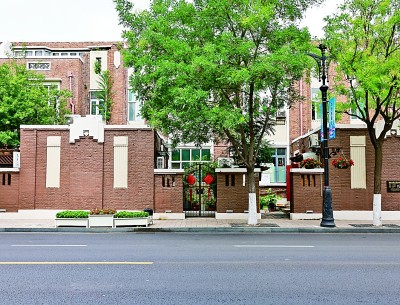
Former site of the North China Liaison Bureau Radio Station, No. 100 Chengdu Road, Tianjin. (Archival photo)
In midsummer, the reporting team of Guangming Daily visited Tianjin to retrace the places where Xie had once worked in secret.
No. 100 Chengdu Road, Tianjin—a three-story brick villa with black façade and white window frames. Eighty years ago, the mysterious radio station was hidden here.
In today’s Heping District, famed as an “exposition of world architecture,” the villa looks utterly ordinary. Yet visitors come in an endless stream.
“Here we are—this is where the North China Liaison Bureau once transmitted messages.”
“Sure enough, the victory at Taierzhuang owes something to this place,” remarked a stout young man.
“The greatest sound is scarcely heard, the greatest form leaves no trace. To face the enemy in disguise, unflinching in peril—that is the mark of a true hero,” murmured a young woman.
“Who would have thought that this unassuming house concealed such a gripping tale?”
“It is just like the poem says: ‘Unconcerned with showing beauty in spring, only heralding its arrival.’”
The young visitors chatted in awe, their expressions solemn.
By Guangming Daily reporters Jia Yueyang, Wang Zhongyao, Wang Yizhao.
Guangming Daily, August 12, 2025, Page 1.
Translated by Zhang Andi.
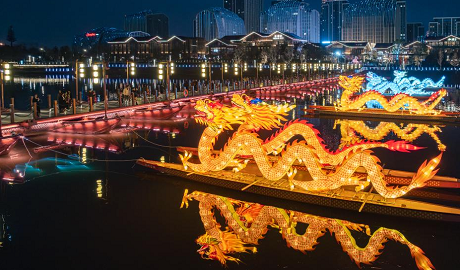
Various festive events held across China to celebrate upcoming Chinese New Year

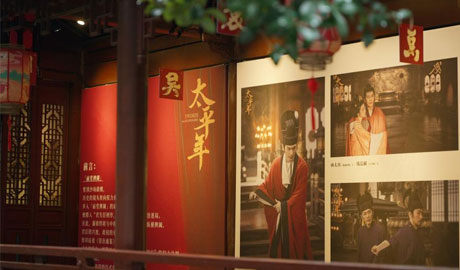
Hit epic drama sparks interest in lesser-studied chapter of ancient Chinese history
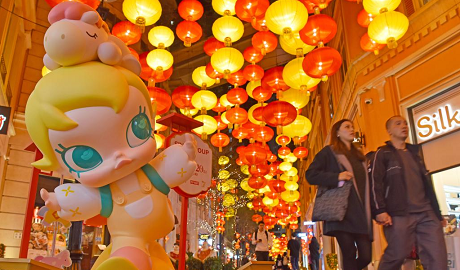
Lanterns hoisted to mark upcoming Chinese New Year in Hong Kong
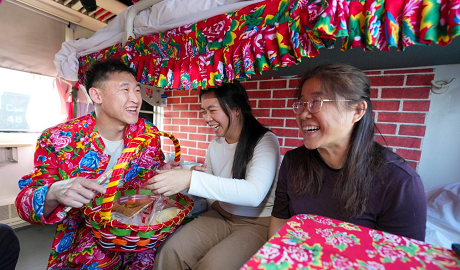
"In-train fair" launched in NE China's Heilongjiang amid Spring Festival travel rush
点击右上角![]() 微信好友
微信好友
 朋友圈
朋友圈

请使用浏览器分享功能进行分享
